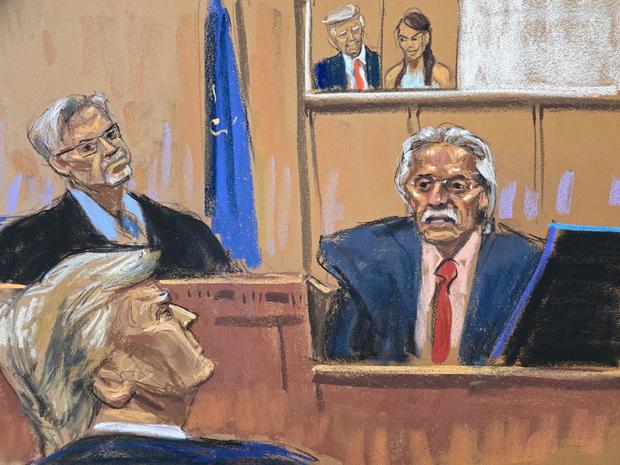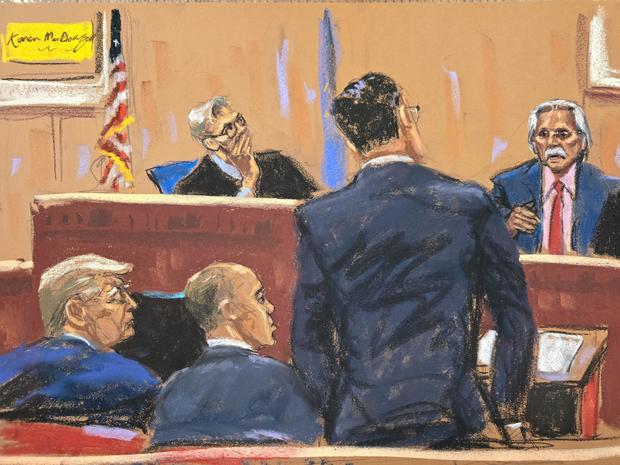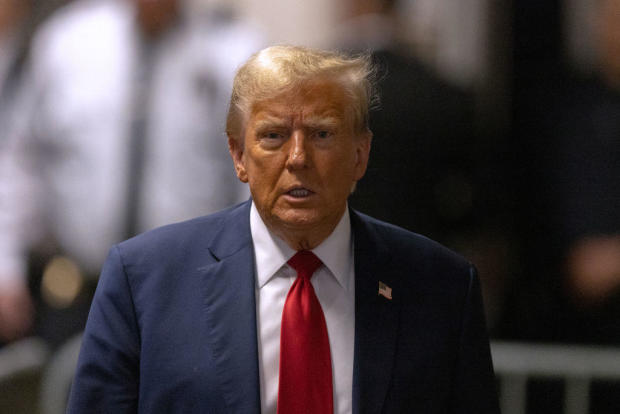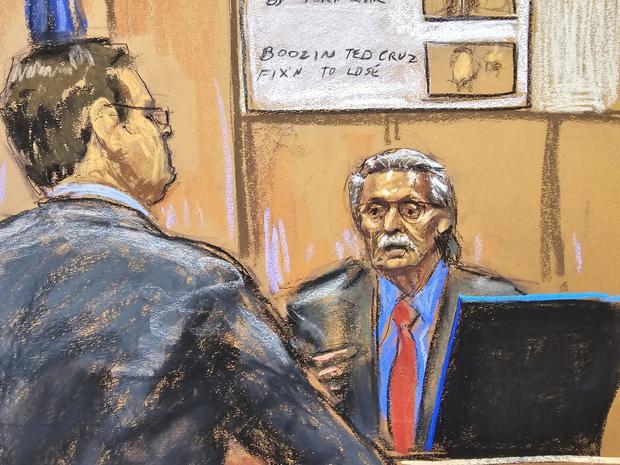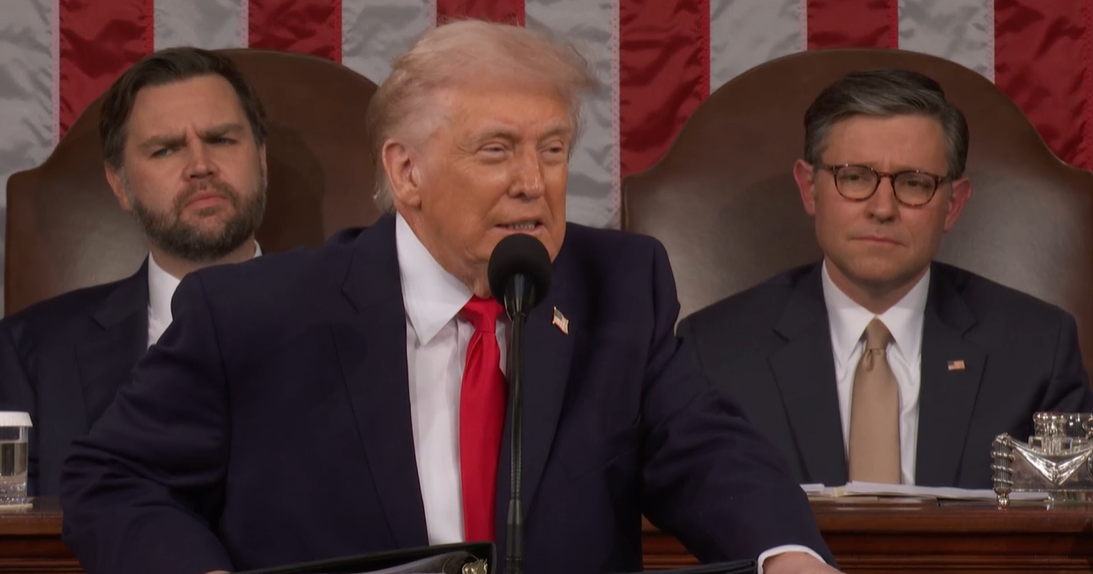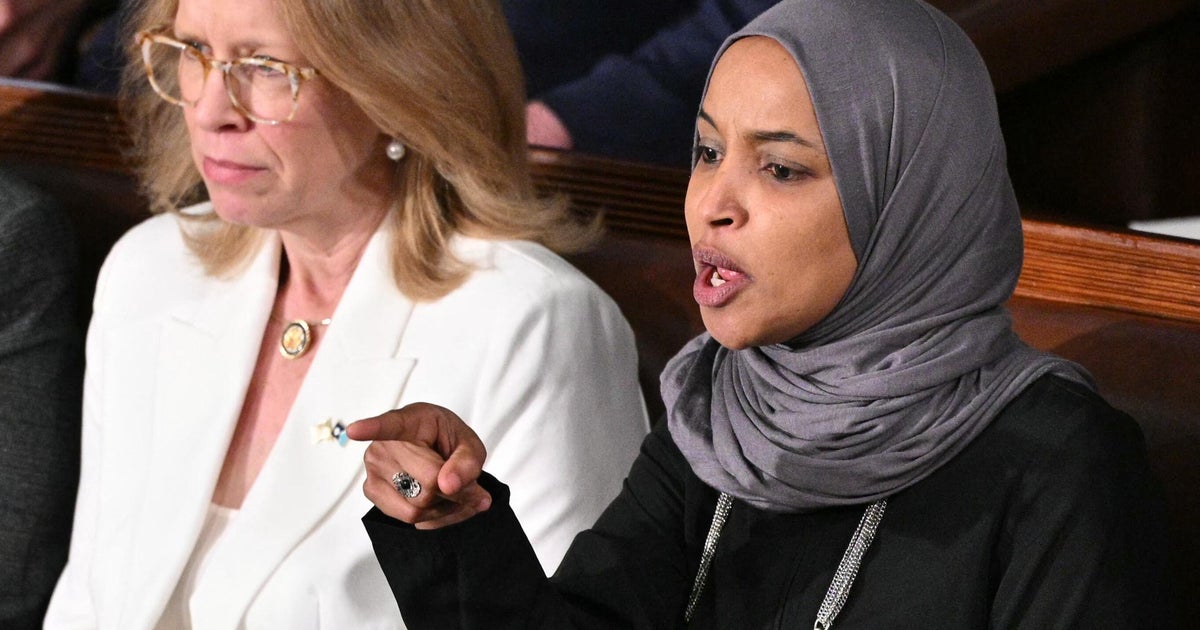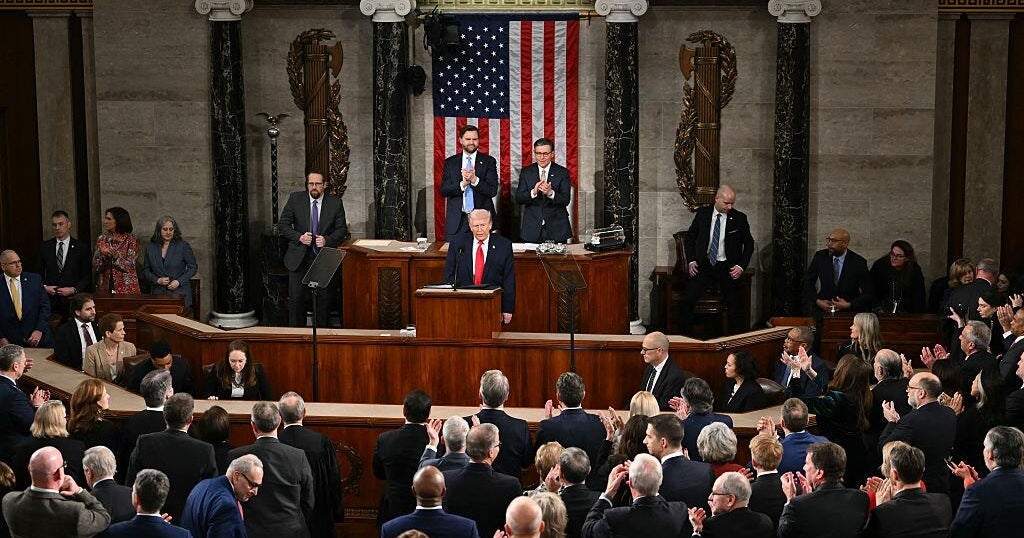Trump trial hears new details about alleged "catch and kill" scheme as Pecker continues testimony
David Pecker, the former publisher of the National Enquirer, revealed new details about his efforts to bury negative stories to shield Donald Trump's 2016 presidential campaign, including a $150,000 deal with a former Playboy model who said she had an affair with Trump.
Appearing for his third day on the stand in Trump's criminal trial in New York, Pecker detailed how the Enquirer bought the rights to Karen McDougal's story but never published her allegations, a tactic that would come to be known as "catch and kill."
He also recounted how he became aware of Stormy Daniels, the adult film star who said she had sex with Trump and agreed to keep quiet in exchange for $130,000. That payment was made days before the 2016 election by Michael Cohen, then Trump's attorney.
Pecker told jurors why he declined to purchase the story rights himself.
"I said, I don't want the National Enquirer to be associated with a porn star. Our largest retailer is Walmart ... This would be very bad for the magazine, very bad for American Media and I don't want any affiliation," he said, referring to American Media, Inc., which owned the Enquirer. Pecker was the CEO of AMI until 2020.
Trump has denied both McDougal and Daniels' accounts. He faces 34 counts of falsifying business records to conceal his reimbursements to Cohen for the "hush money" payment, and has pleaded not guilty.
McDougal reached an agreement with the Enquirer in August 2016. In exchange for the $150,000, she agreed to turn over the rights to her story about the alleged affair. The deal also called for her to write a column for various AMI publications and allow the company to use her image.
Pecker testified that those provisions were included to obscure the true purpose of the agreement: preventing McDougal's account from coming to light. He also said AMI crafted the deal to avoid triggering campaign finance laws.
"We purchased the story so it wouldn't be published by any other organization," he said later, referring to himself and Michael Cohen, Trump's then-attorney and a key witness in the case. "We didn't want the story to embarrass Mr. Trump or embarrass or hurt the campaign."
The prosecution ended their questioning of Pecker on Thursday, and Trump's attorneys will continue their cross examination when court resumes on Friday.
Trial ends for the day, with Pecker set to return to the stand Friday
Bove, Trump's lawyer, wrapped up the day's proceedings by questioning Pecker about his recollection of the August 2015 meeting at Trump Tower, and his meetings with prosecutors in the summer of 2018.
Jurors appeared to be losing interest in the testimony, and the judge adjourned for the day shortly before 4:30 p.m. Pecker will return to the stand on Friday morning.
Defense kicks off cross examination with questions about Pecker's history of killing stories
Emil Bove, one of Trump's attorneys, took the lead as the defense's cross examination got underway. He questioned Pecker about his early relationship with Trump, and how he began tipping Trump off to negative stories nearly 30 years ago.
Pecker said he first gave Trump a heads up about a story in 1998. Bove said by the meeting in Trump Tower in 2015, Pecker had been "providing President Trump a heads up about negative publicity" for 17 years. Pecker agreed.
Bove had Pecker walk through negative stories that he had killed about other figures, including Arnold Schwarzenegger and Tiger Woods. Pecker said AMI bought the rights to a story about Woods and obtained unspecified photographs to use as leverage to get Woods to grant an interview with and appear on the cover of Men's Fitness, another AMI publication.
Pecker also said AMI helped obtain and suppress stories about the actor Mark Wahlberg and Rahm Emanuel, President Barack Obama's first chief of staff and later the mayor of Chicago.
Pecker also noted he had not heard the term "catch and kill" used to describe the practice of buying up stories until the Trump investigation.
As prosecution ends questioning, Pecker says Trump was his "mentor"
Steinglass, the prosecutor, wrapped up the state's questioning of Pecker by asking if he had any ill will toward Trump.
"Quite the opposite. Donald Trump was my mentor. He helped me throughout my career," he said.
He recalled Trump's reaction in October 2001, when an AMI photo editor died after a letter that contained anthrax was mailed to AMI's Florida headquarters.
"And the first person who called me, if I needed help, was Donald Trump. He was very helpful, recommended an attorney," Pecker recalled.
"So I have no ill will at all. I still consider him, even though we haven't spoken, I still consider him a friend," he said, looking over at Trump, who appeared to look back. "I said even though we haven't spoken, I still consider you a friend."
Pecker says Trump was "very upset" after McDougal came forward
Returning from a break, Pecker recalled meeting McDougal for lunch in August 2017, their first face-to-face meeting.
The agreement she signed with the Enquirer was revealed by the Wall Street Journal just days before the 2016 election. Earlier in his testimony, Pecker said he agreed to amend their deal to allow McDougal to speak to the press after the Journal story ran. He said he set her up with a media consultant who reported to him.
At the 2017 lunch, Pecker said McDougal talked about articles she was writing and her career aspirations. "My standpoint was that we were complying to the agreement and that she was comfortable," he testified. "I wanted her to remain in our family, I should say."
Steinglass, the prosecutor, then displayed another Wall Street Journal headline from Jan. 12, 2018: "Trump Lawyer Arranged $130,000 Payment for Adult-Film Star's Silence." The story was the first public acknowledgement of Cohen's payment to Daniels. At the beginning of March, Daniels, represented by attorney Michael Avenatti, sued Trump to get out of the agreement with Cohen.
McDougal granted CNN an interview that aired on March 23, 2018. Pecker said he watched it that night, and Trump called him about it the next day.
"Did you see the Anderson Cooper interview with Karen McDougal?" Trump asked, according to Pecker. "I thought we had an agreement with Karen McDougal that she can't give any interviews or be on any television shows."
Pecker said he told Trump about the amendment allowing McDougal to speak to the media. He said Trump became aggravated, saying he "could not understand why" he would change the deal. Pecker said he pushed back, telling Trump that McDougal had been flooded with media requests.
"He was very upset, he couldn't understand why I did it. That was basically the conversation," Pecker testified.
Pecker said he then spoke with Trump aide Hope Hicks and Sarah Huckabee Sanders, the White House press secretary. He said he intended to extend the contract with McDougal. "They both said it was a good idea," Pecker testified.
McDougal sued AMI soon after. Pecker said he settled the lawsuit and relinquished the rights to her life story.
Pecker recalls Trump thanking him after 2016 election
Pecker said he met with Trump at Trump Tower when he was president-elect in January 2017.
"I've never seen security like that in my lifetime," he said. He said he walked into Trump's office to find James Comey, Sean Spicer, Reince Priebus and Mike Pompeo. Trump was receiving a briefing about a shooting in Fort Lauderdale, Florida.
"He said, 'Here is David Pecker, he is the owner and publisher of the National Enquirer. He probably knows more than the people in this room.' Nobody laughed," Pecker testified.
Pecker said Trump expressed gratitude for his work to secure the rights to "embarrassing" stories.
"I want to thank you for handling the McDougal situation" and the "doorman situation," Pecker recalled Trump saying.
"I felt that he was thanking me for buying them, and for not publishing any of the stories. And for helping the way I did," Pecker said.
Pecker later added that when Trump said the stories were "embarrassing," he believed Trump was referring to their impact on his campaign.
"His family was never mentioned," Pecker said.
Pecker said he also advocated for Cohen, telling Trump that his attorney was concerned about his year-end bonus.
"Don't worry about it. I'll take care of it," Trump replied, according to Pecker.
Prosecutors say the reimbursements from Trump to Cohen that are at the heart of the case included not only repayment for money Cohen paid to Daniels, but also Cohen's bonus.
Why Pecker refused to pay for Stormy Daniels' story
Returning to the stand after a brief break, the questioning moved on to the circumstances surrounding the $130,000 payment that Cohen ultimately made to Stormy Daniels, the adult film star who said she had a sexual encounter with Trump. Trump denies her account.
Pecker said he was having dinner with his wife in early October 2016 when he received an "urgent call" from Dylan Howard, the Enquirer's editor. Howard told him he had been contacted by Keith Davidson, McDougal's attorney, and Gina Rodriguez, a talent agent. They were shopping Daniels' story.
Howard told Pecker that they could "acquire the story for $120,000 if we make the decision right now." The conversation came after the emergence of the infamous "Access Hollywood" tape, a recording from 2005 in which Trump said he could "grab [women] by the p****" and "make them do anything." The tape had become a major flashpoint in the presidential campaign, with the election just weeks away.
Pecker said he told Howard, "We can't pay $120,000."
"I said, I don't want the National Enquirer to be associated with a porn star. Our largest retailer is Walmart," he testified. "This would be very bad for the magazine, very bad for American Media and I don't want any affiliation."
Pecker said he remembered speaking to Cohen about Daniels and refusing to buy the story, telling him, "I am not a bank." He told Cohen to pay for the story himself, saying he had already spent $180,000 on the prior two "catch and kill" stories.
"'Michael, my suggestion to you is you should buy this story and take it off the market,' I said, 'because if you don't and it gets out, I think the boss is going to be very angry with you,'" Pecker testified.
Pecker describes talks with Cohen over transferring McDougal story rights
In September 2016, having not been reimbursed the $150,000 for McDougal's story, Pecker said Cohen contacted him and said Trump wanted to acquire the rights. When Pecker asked why, Cohen told him "the boss" wanted to control the story in case Pecker got "hit by a bus" or "the company got sold."
Pecker said he told Cohen he would knock $25,000 off the price to cover editorial expenses and bill Cohen for the rest. He testified that Cohen "wanted the contract done yesterday." Pecker said he hoped to have the deal done by Sept. 30, the end of the quarter.
Pecker said he wanted the transaction routed through a third party to avoid AMI cashing a check from the Trump Organization. He said such a payment would raise questions among editors and others in the company.
He said he enlisted a company owned by a former AMI executive called Investor Advisory Services to handle the payment from an LLC created by Cohen, called Resolution Consultants.
Prosecutors displayed an invoice for $125,000 from Investor Advisory Services to Resolution Consultants, dated Sept. 21, 2016. The description of services said the payment represented an "agreed upon flat fee for advisory services." Pecker said the payment was actually for the rights to McDougal's story.
The agreement to transfer the story was signed on Sept. 30 but never executed, Pecker testified. He said AMI's general counsel advised against going forward with the transfer.
"I called Michael Cohen and said to him, 'The assignment deal is off. I'm not going forward. It's a bad idea. I want you to rip up the agreement,'" Pecker testified. "He was very upset, screaming basically."
"To be clear, Mr. Pecker, did AMI ever get reimbursed for the money it spent to acquire the exclusive rights of Karen McDougal's story?" Steinglass, the prosecutor, asked.
"No," Pecker answered.
Pecker says he had no intention of publishing McDougal's story
Pecker testified that the deal to obtain the rights to McDougal's story included other provisions that were intended to obscure the true purpose of the agreement: to keep her account of an alleged affair with Trump out of public view.
Prosecutors displayed the contract for the jury. The "limited life story rights" covered "any romantic, personal and/or physical relationship McDougal has ever had with any then-married men." Pecker said this was "referring to Donald Trump."
Other aspects of the agreement stipulated that McDougal would write a column for some of AMI's publications, and she gave the company the right to use her name, likeness and image. Pecker said he wanted those provisions included in the contract "to substantiate the $150,000 agreement" and to avoid triggering campaign finance laws.
"With respect to campaign laws, I wanted to have the contract be a record that stipulates that, for the services that she was going to perform for American Media, as a basis for it, for the $150,000," Pecker said.
Steinglass, the prosecutor, asked if the inclusion of those provisions was meant to disguise the true nature of the contract. "Yes, it was," Pecker said. Asked if he had any intention of publishing her story, he replied, "No, we did not."
"We purchased the story so it wouldn't be published by any other organization," he said later, referring to himself and Cohen. "We didn't want the story to embarrass Mr. Trump or embarrass or hurt the campaign."
Pecker describes buying McDougal's story to "take it off the market"
With Pecker back on the stand, prosecutor Joshua Steinglass picked up where questioning left off on Tuesday: the second use of "catch and kill" to quash a negative Trump story in 2016. This claim came from Karen McDougal, a former Playboy model who said she had an affair with Trump, which he denies.
Pecker recalled the National Enquirer's editor, Dylan Howard, first hearing about the story from McDougal's attorney, Keith Davidson. Pecker described Davidson as a "major source" for Howard and said he had heard another group was pursuing the story for $8 million.
"I felt that this story should be purchased," Pecker said.
He said he fielded a phone call from Trump in June 2016, while Pecker was at an investor meeting.
"[Trump] said, 'What should I do?'" he testified. "I said, 'I think you should buy the story and take it off the market.'"
Pecker said Trump described McDougal as "a nice girl." He said Cohen soon called him and said "you should go ahead and buy this story" and "the boss will take care of it." Pecker said he understood that to mean Trump or the Trump Organization would pay him back.
Howard negotiated terms for the rights to McDougal's story, and brought Pecker the offer: $150,000 for the lifetime rights and other provisions, Pecker testified. He said Cohen grew agitated as negotiations dragged on.
Pecker said he pushed back on footing the bill.
"'$150,000, who is going to reimburse me for this?'" he said he asked Cohen. "And he said, 'Don't worry about it, I'm your friend. The boss will take care of it.'"
The deal was finalized in August 2016, with the National Enquirer obtaining the story.
"I called Michael Cohen and I told him that we finalized the agreement with Karen McDougal, that the contract was bulletproof and that we consulted with a campaign attorney," Pecker testified.
Prosecutors say Trump violated gag order 4 more times
As proceedings got underway, Chris Conroy, an attorney from Manhattan District Attorney Alvin Bragg's office, told the judge that Trump had violated the gag order limiting what he can say about those involved in the case four more times over the last three days. One of those violations included an interview Trump gave that aired on Tuesday, in which he called Michael Cohen "a convicted liar."
As Conroy read the alleged violations, Trump sat emotionless at the defense table, staring forward.
Conroy cited Trump's campaign event earlier in the morning, where he was asked what he thought of Pecker's testimony. Trump said he had been "very nice." Conroy said this was a message to Pecker and other witnesses to "be nice."
Merchan did not issue a ruling on the matter, and Pecker soon entered the courtroom, followed by the jury.
Trump comments on "very important" Supreme Court arguments
The former president arrived at the courthouse and, in a now-familiar ritual, stopped to speak to cameras before entering the courtroom.
He blamed President Biden for weaker-than-expected economic growth numbers released earlier in the morning, and talked about his campaign stop at a construction site. He also briefly commented on the immunity arguments before the Supreme Court. The judge did not allow him to miss the trial so he could attend.
"I think that the Supreme Court has a very important argument before it today. I would have loved to have been there but this judge would not allow that to happen," he told reporters. "I should be there, but he wouldn't allow it to happen. I think he puts himself above the Supreme Court, which is unfortunate, isn't it?"
He repeated his contention that former presidents should be immune from federal prosecution. If not, he said, presidents "aren't going to take any risks, both good and bad."
Judge could rule on Trump contempt motion
Judge Juan Merchan may also rule Thursday on a motion by prosecutors seeking to hold Trump in contempt for a series of social media and campaign posts they say violated a gag order in the case.
The order limits what Trump can say publicly about many of those involved in the case, including witnesses like Cohen and Daniels.
Merchan held a contentious hearing on the motion Tuesday. Prosecutors have asked him to impose a $1,000 fine for each post and order Trump to take them down.
"His attacks on witnesses clearly violate the order, willfully and flagrantly. The court should now hold him in contempt for each of the 10 posts," prosecutor Chris Conroy said. "No one is off limits to the defendant. He can attack and seek to intimidate anyone he wants to in service to himself."
Todd Blanche, an attorney for Trump, argued that his client was responding to political attacks in his posts, and did not believe he was violating the order when reposting or quoting others. The judge seemed unpersuaded, but did not make a ruling immediately.
"Mr. Blanche, you're losing all credibility. I have to tell you that right now. You're losing all credibility with the court," Merchan said at one point.
What Pecker testified on Tuesday
On Tuesday, Pecker told the court that he agreed to be Trump's "eyes and ears" in 2015 and alert Trump's attorney, Michael Cohen, to damaging stories that might hurt Trump's presidential campaign. Cohen is now an ardent critic of Trump, and is expected to be prosecutors' key witness against him.
Pecker described a tactic called "catch and kill" that he used to buy the rights to stories about Trump, without publishing them, effectively keeping them hidden. He described a meeting with Trump and others in 2015 where Pecker agreed to be on the lookout for damaging material.
"I said, 'I would be your eyes and ears,'" Pecker told the court. "And then I said that anything that I hear in the marketplace, if I hear anything negative about yourself or if I hear anything about women selling stories, I would notify Michael Cohen."
Pecker said he thought there would be "a lot of women com[ing] out to try to sell their stories because Mr. Trump was well-known as the most eligible bachelor, and dated the most beautiful women." He said the arrangement was "a mutual benefit — it would help his campaign, it would also help me."
Asked how Trump reacted, Pecker said, "As I recollect, he was pleased. Michael Cohen was pleased." He said nothing was put into writing, describing it as "an agreement among friends."
Trump makes early morning stop to NYC construction site
Trump visited a construction site in New York City early Thursday morning, before returning to court for his alleged "hush money" trial.
The former president met with a group of workers at the corner of East 48th Street and Park Avenue, near the JP Morgan Chase Building in Midtown Manhattan.
Trump showed up around 6:30 a.m., and the campaign stop lasted about 15 minutes. He shook hands, posed for photos and signed autographs for people who went through a security screening to enter a penned-off area.
Some supporters said they woke up early for the chance to catch a glimpse of him.
Read more at CBS New York.
